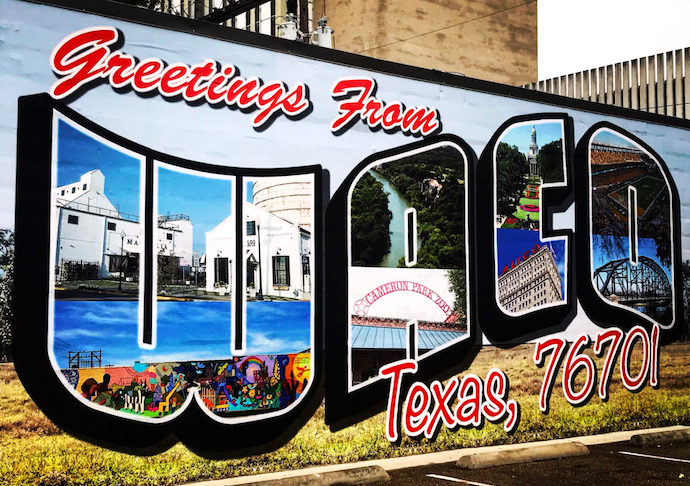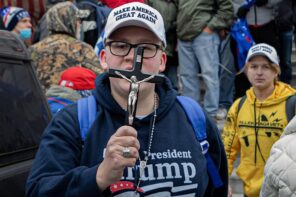This coming Saturday, March 25th—one week after a hysterical all-caps social media post in which he declared that he “will be arrested on Tuesday” and called on supporters to “protest, take our nation back!”—Trump will host his first formal rally of the 2024 presidential campaign season at the Waco Regional Airport. The location is, in theory, all about the positive Trump vibes in Texas. As his campaign staff wrote, “It is undisputed that Texas is Trump Country after electing 37 Trump Endorsed Candidates and recent polling among Texas primary voters.”
Indeed, Waco boasts the largest Baptist university in the world, which should come in handy as Trump will be forced to court religious support much more aggressively this time around. Waco is also home to the Texas Rangers Hall of Fame, which not only shares his rhetoric of border security but also his lengthy history of anti-Hispanic violence. And its location “in the heartland of Texas” makes it a great opening spot for his campaign.
And Waco, as many will recall, has other violent associations. There’s the brutality of the Jim Crow era—the “Waco Horror” is aptly named—and, as far too many people online have pointed out, the rally is scheduled during the 30th anniversary of the siege of the Mount Carmel compound of the Branch Davidians. Of course, Trump is not David Koresh, and “cult” is a political designation whose terms are aggressively manipulated against new religious movements (or, in the case of the Branch Davidians, offshoots of well established Christian denominations).
MAGA is essentially a political movement, not a new religious one (even if, as Catherine Wessinger has argued, a significant portion of Trump’s most active base may be seen as one). What Waco offers to the far-right, though, is a platform for their continued grievance mongering against the government. The Waco siege is not only a place for conspiracy thinking by far-right churches, it was also an inspiration for Timothy McVeigh, and it remains an inspiration for far-right groups to this day.
The location would matter less if Trump hadn’t spent the past several weeks spreading rage, violent rhetoric, promises of divine retribution, and apocalyptic visions of the future. His CPAC speech laid out a vision of enemies holding off the Promised Land:
They are bad for us. They want us to fail. They want our country to go down. They are sick people. Change only happens if we plow fearlessly ahead and declare with one voice that the era of woke and weaponized government is over. That is our task. That is our mission. This is the turning point and the time for that decision because, as you’ve probably heard me say before, we will not back down. We will not bend. We will not quit. We will not yield. We will press forward with push. We will press forward with vigor. We will push onward, and we will finish what we started.
We started a great, great, positive revolution. Nobody’s ever seen anything like it before. It’s called Make America Great Again. We want to make America great again. We will cross the finish line. We will dismantle the deep state. We will demolish woke tyranny, and we will restore the American republic to all of its radiant glory, and with God’s help and your support, we will make America powerful again. We want to have a powerful country. We need to have a powerful country.
We will make America wealthy again. We will make America strong again. That’s what we want. We want strength. Think of your heart pounding, we will make America proud again. We will make America safe again, not like our streets of the cities which are a disgrace for the entire world to watch, and we will make America great again.
This kind of rhetoric is dangerous. It isn’t just the grievance mongering and generic language of violence, it’s a call to holy war—an eschatological vision of the Kingdom of Heaven that awaits them on the other side of what he describes as “the final battle.” This holy war is less Bible and more Rainbow Kitten Surprise (“Purify the palace, purify the streets”)—a call to street violence and purging the “deep state” rather than a reckoning with judgment.
Of course, as many have pointed out, it’s highly unlikely Trump will be arrested today as he’s the only source for the claim, but it’s notable that he continues to use rhetoric reminiscent of his CPAC speech; rhetoric that amounts to a thinly-veiled call for violence:


This is again the language of the Enemy—“radical left anarchists,” “criminals & leftist thugs,” rage against immigrants—destroying the nation, with claims that “Our Nation is now Third World & Dying. The American Dream is Dead,” that “the heart of our country” has been stolen, that “patriots are being arrested & held in captivity,” referencing the J6 prisoners.
And he ends by saying, “Protest, Take Our Nation Back!” Now, while those protests have not yet materialized, the push to violence includes bizarre online chatter about making a “patriot moat” around Mar-a-Lago to defend him. And, if anything, he’s actually ramped up this rhetoric since, calling his opponents “animals,” and leaning sharply into what scholars call “genocidal rhetoric.”
And then there are those in his entourage who have made public statements about this, including Joseph McBride, who’s raising money to represent “the legal needs of the January Sixers,” and Franklin Graham, who came to Trump’s defense two days after his initial Truth Social posts:
We need to pray for our country and where it is headed. The left in Washington and across the country just can’t get their fill of attacking Donald Trump. They are so paranoid of him. The onslaught against him is continual. There’s no question, the media and the left manipulated…
— Franklin Graham (@Franklin_Graham) March 20, 2023
Not only does Graham promote Trump’s bogus claims of electoral fraud—“manipulated the last election”—but he also asserts that “the charges against [Trump] are definitely politically motivated,” despite the fact that the former president hasn’t actually been charged. What he calls for is standard evangelical protection for Trump:
“I would like to ask Christians across this country to pray specifically for former President @realDonaldTrump, that God’s hand would be upon him, protect him, and direct him in every step he takes—and that God’s will be done. We need to work together to strengthen this nation—not divide and destroy it.”
And, of course, despite everything he very much remains their secular champion.
McBride, on the other hand, emphasizes something very different. In a pair of tweets, he portrays Trump as a messianic figure:
President Trump will be arrested during Lent—a time of suffering and purification for the followers of Jesus Christ.
As Christ was crucified, and then rose again on the 3rd day, so too will @realDonaldTrump.
Violence is never the answer. Winning the election is. Vote for Trump!
— Joseph D. McBride, Esq. (@McBrideLawNYC) March 18, 2023
JESUS LOVES DONALD TRUMP.
JESUS DIED FOR DONALD TRUMP.
JESUS LIVES INSIDE DONALD TRUMP.
DEAL WITH IT.
— Joseph D. McBride, Esq. (@McBrideLawNYC) March 18, 2023
As Mark Leuchter, professor of religion at Temple University points out, these tweets make the call to protests something more than just a political act: “by making the upcoming arrest a matter of eschatology: violent demonstrations for Trump are part of God’s war against evil, and if you don’t fight, your soul will perish.” And this is the crux of it—the call to holy war is a rhetoric that weaves in and out of the campaign in this moment.
It likely won’t work. Mass protests in Manhattan? The DA’s office has set up barricades, and Proud Boys who tried to intimidate a Drag Story Hour hosted by New York Attorney General Letitia James met strong resistance. But it’s a rhetoric of eschatological violence, an apocalyptic framework that encourages violence against their political opponents.
Waco is a campaign stop, but it’s also an emblem of anti-government violence, and an especially potent one when combined with repeated messages about the tyranny and violence of their opponents. Mass protests might not materialize, but the call to stochastic terrorism, motivated by religio-political ideology, is pouring out of the Trump campaign this week, and we should be worried about it.





